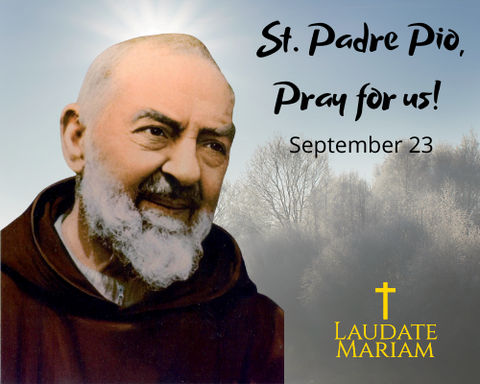St. Padre Pio, who received the stigmata of Christ in 1918 and bore it for fifty years until his death, is one of the most beloved of saints in the Catholic Church. His feast day is celebrated every September 23. So many books have been written about him documenting his saintly life, his numerous miracles, as well as his God-given supernatural abilities such as bi-location.
But if we take a closer look at Padre Pio’s life, by the world’s standards, his life wasn’t that “great”. In fact, by the world’s standards, it was a difficult and seemingly “terrible” life to live.
Rejected by His Superiors and Even by the Pope
Padre Pio was rejected by his superiors and by the Catholic Church for decades. By the world’s standards, such a life - a lifetime of rejection, in fact - was not a “great life” at all.
Because of the unusual abilities Padre Pio was said to possess, the Holy See instituted investigations of the holy priest. The local bishop did not believe Padre Pio’s miracles, suggesting that his Capuchin brothers were making a display out of the monk to gain financial advantage. When Pius XI became pope in 1922, the Vatican became even more doubtful of Padre Pio, and initiated more investigations.
The Vatican subsequently imposed severe sanctions on Padre Pio to reduce publicity about him: it forbade him from saying Mass in public, blessing people, answering letters, showing his stigmata publicly, and communicating with Padre Benedetto, his spiritual director. Padre Pio was eventually relocated (“banished”, in reality) to a remote convent in northern Italy, away from the public eye, and in complete personal isolation.
By the world’s standards, Padre Pio did not live such a “great life”.
Physically Attacked by the Devil
Padre Pio was tormented by the devil frequently. Who wants to be attacked by the devil every night? By the world’s standards, such a life is not a “great life” at all.
Even as a young child, Padre Pio already experienced the terrible attacks of the devil. That battle with the evil one persisted all throughout his entire life! The devil’s attacks on Padre Pio were not just spiritual in nature - he was often physically attacked by demons! They scourged him with heavy chains, leaving him bleeding. Sometimes they appeared as gruesome animals.
On December 20, 1910, Padre Pio wrote: “I am in the hands of the devil who is trying to snatch me from the arms of Jesus. Dear God! What a war he is waging against me! There are moments in which I am on the point of losing my reason through the continual violence I must do myself. How many tears and groans, dear Father, I send up to heaven in order to be set free. But no matter, I will never tire of praying to Jesus.”
By the world’s standards, such a life was not a “great life” at all.
Suffered the Wounds of Christ

Padre Pio suffered the stigmata of Christ - debilitating, painful, incurable wounds on his hands and feet that he had to bear for 50 long years, from the time he first received the stigmata (in 1918) up to his death in 1968.
Who wants to have an incurable wound? Who wants to have open wounds that could not be treated - more so, in one’s hands that we use to work, or in one’s feet that we use to walk around with ease? Isn’t it that by the world’s standards, if we get a little wound now, we always try to treat it right away and heal it? By the world’s standards, Padre Pio did not live such a “great life”.
The World Teaches Us to Avoid Suffering
The world teaches us to avoid suffering and difficulties. The world encourages us to admire people who accumulate vast wealth. The world inspires young people, in particularly, to aspire for and live like their rich and famous idols, who live “perfect lives”, going around the world in their expensive yachts and luxury private planes. The world encourages us to admire and glorify famous people - famous singers and artists who are adored and glorified by millions of people all over the world.
The world teaches us that “greatness” is all about working hard in school so that we can get a good high-paying job, or build a thriving business, and eventually becoming rich and famous. The world teaches us that “greatness” is all about achieving all the comforts and pleasures in this life, and to avoid suffering and difficulties at all cost.
Social media helps amplify this notion of what a “great life” truly is. We see every single day in social media people sharing and trumpeting to the world what a truly “great life” they are living - traveling abroad in luxury, enjoying sumptuous food that poor people cannot even afford to eat in their in entire lifetimes, buying million peso designer bags and million peso cars while our fellow countrymen cannot even to buy 3 meals a day for their families. We are all guilty, in some way, of helping amplify this truly false and destructive notion of what a “great life” is.
By the world’s standards, Padre Pio wasn’t “great” at all. His life wasn’t “great” at all. In fact, by the world’s standards, we should do everything in our power to avoid living a life like Padre Pio!
If Padre Pio lived today, do you think he will take a selfie and a closeup of his stigmata and brag about his truly “great life” on Facebook or Instagram - complete with beautiful filters and trendy hashtags? People nowadays would look at Padre Pio and say silently to themselves: “What a poor guy! What a truly unfortunate life! Why does God not bless him with comfort, riches, and a pain-free life? It’s a good thing I live a life better than him!”
What Makes a Truly Great Life?
Padre Pio’s life was the exact opposite of what a “great life” is, according to the world’s standards. And yet, it is precisely for this reason that Padre Pio is rightfully recognized as one of the greatest saints in history. Padre Pio lived a great life because he lived like His Lord and King, Jesus Christ. Just like His Master, Jesus Christ, Padre Pio bore his difficulties and sufferings in life with patience, and offered his own life for God and for men. Just like his Master, he took up his cross and carried it with love and patience.
By denying himself, accepting all his crosses in life, and offering all of these to the Lord, he now enjoys a truly blissful life in Heaven in glory. His sufferings during his earthly life are now completely forgotten, and God has repaid him for his life of self-giving and sacrifice a billion times over in Heaven. He is now living a “great life” - the “greatest life” that we should all aspire for, which is to live in Paradise with God and the saints.
What Kind of Life Do We Aspire For?
On this feast of Padre Pio on September 23, let us reflect on his life and his example. What do we truly aspire for in this life? What is our goal in life? What is our vision for ourselves and our family? Is it to live the kind of “great life” that is glorified by the world today? Is it to accumulate vast amounts of wealth? Is it to become the most famous person in our chosen profession or field?
How do we look at the sufferings and trials in life that God gives to us? In the midst of this pandemic, many of us do encounter many crosses and trials in life - be it financial difficulties, mental health issues, sickness and death in the family, and many others. How do we react to these crosses in life? Do we complain to the Lord? Do we look with envy at the life of others who seemingly do not have the same crosses and trials that we encounter? Or do we - like Padre Pio who bore his stigmata in patience and acceptance - accept these crosses, offer these to the Lord, and thank Him for all the wonderful blessings He has given us?
Let us thank Our Lord Jesus Christ for the crosses He brings to our lives. These crosses are our ticket to Heaven - if we bear them patiently, silently, and offer them to the Lord. All we need to do is to say: “Jesus, thank you for giving me this cross. I accept it, and I offer it to you, for the salvation of my soul and that of my family and the rest of the world.”
Our Lord will accept our generosity with love and compassion, and He will make our burden lighter. He will never abandon us - He will never give us a cross that we cannot bear. He will, in fact, help us carry this cross. He will then turn these little crosses that we offer to Him into beautiful, glittering crowns of glory that He will place on our heads, when we enter our real home later on - Heaven. That goal - Heaven - is the great life that all of us should truly aspire for.

